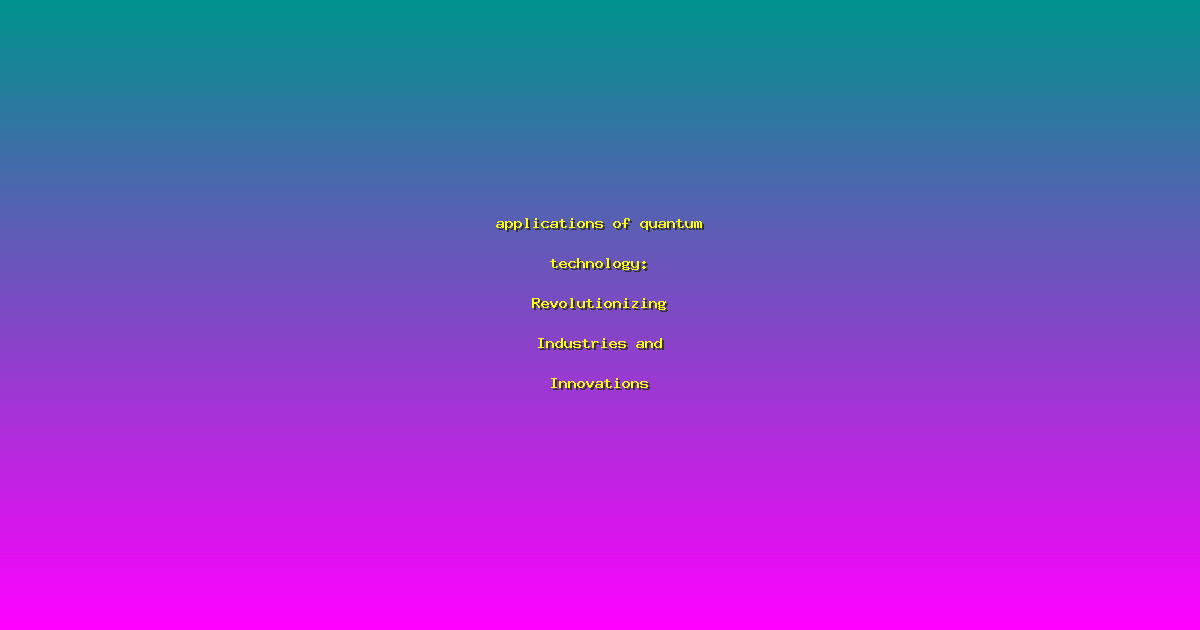Applications of Quantum Technology: Revolutionizing Industries and Innovations
Introduction to Quantum Technology
Quantum technology harnesses the principles of quantum mechanics to develop new technologies that can perform tasks that are either impossible or impractically difficult with classical technologies. This paradigm shift is poised to revolutionize a myriad of fields, from computing and cryptography to healthcare and energy. The application of quantum technology is not just about enhancing current capabilities; it's about opening up entirely new possibilities that were previously beyond reach.
Quantum Computing: An Unprecedented Leap in Processing Power
Quantum computers leverage the unique properties of quantum bits, or qubits, to perform calculations at an unprecedented speed. Unlike classical computers, which process information using bits that are either 0 or 1, quantum computers use qubits that can exist in multiple states simultaneously, enabling them to solve certain problems much faster.
The potential applications of quantum computing are vast and varied, including optimization problems, cryptography, and complex simulations in chemistry and materials science. This technology is still in its infancy but is rapidly advancing, with significant investments from governments and private companies around the world.
Quantum Cryptography: A Breakthrough in Data Security
Quantum cryptography uses the principles of quantum mechanics to secure communication. One of its key applications is quantum key distribution (QKD), which allows two parties to share a secret key with absolute security. If an eavesdropper tries to intercept the key, the system becomes aware of the intrusion due to the nature of quantum mechanics, ensuring that the communication remains secure.
As conventional cryptographic methods face increasing threats from both quantum computing advancements and other emerging technologies, quantum cryptography presents a promising solution to secure sensitive data and communications in the digital age.
Quantum Sensing and Metrology: Enhancing Precision and Accuracy
Quantum sensors leverage quantum phenomena to achieve levels of precision and accuracy that are far beyond the capabilities of conventional sensors. Applications range from detecting gravitational waves to measuring extremely small magnetic fields, which can aid in medical imaging and geological surveys.
These sensors can also be used in navigation systems, improving the accuracy of GPS and other location-based services, which is particularly useful in environments where traditional satellite-based navigation is unreliable.
Quantum Simulations: Advancing Scientific Research
Quantum simulations use quantum computers to model complex quantum systems, allowing researchers to study phenomena that are too complex to simulate on classical computers. This has significant implications for drug discovery, materials science, and fundamental physics research, potentially leading to breakthroughs in these fields.
By enabling more accurate and detailed simulations, quantum simulations could accelerate the development of new materials, medicines, and technologies, driving innovation across multiple industries.
FAQs
What is quantum technology?
Quantum technology refers to the application of quantum mechanics to develop technologies that operate based on principles unique to this field of physics, such as superposition and entanglement.
Can quantum computers break existing encryption?
Yes, quantum computers have the potential to break certain types of encryption, particularly those based on public-key cryptography, by using algorithms like Shor's algorithm for factoring large numbers.
How does quantum cryptography work?
Quantum cryptography uses the principles of quantum mechanics to secure communication. Any attempt to eavesdrop on the communication is detectable, ensuring secure key distribution.
What are some potential applications of quantum sensors?
Quantum sensors can be used in medical imaging, geological surveys, and improving navigation systems. Their precision and accuracy make them invaluable in many scientific and industrial applications.
What are the current limitations of quantum computing?
Current limitations include the need for extremely low temperatures to maintain qubit stability, error rates, and the limited scalability of current quantum systems.
Conclusion
Quantum technology is at the forefront of technological innovation, promising to transform a wide array of industries and solve problems previously considered intractable. As research and development continue, the full potential of quantum technologies will likely unfold, ushering in a new era of technological advancement.
Call-to-Action
Stay ahead of the curve by exploring the latest in quantum technology. Join forums, attend conferences, and support research initiatives to contribute to the evolution of these groundbreaking technologies.

